
Meet Our Team
Faculty
Edward J. Blum, Ph.D. - Project Director
Email: [email protected]

Edward J. Blum holds the rank of Professor of United States History in the History Department at San Diego State University. He received his B.A. from the University of Michigan and his M.A. and Ph.D. from the University of Kentucky. His research, writing, and teaching involve politics, constitutionalism, war, society, and culture in the United States from the founding of the nation through the era of the Civil War. He has particular interests in how demography, statistics, numeracy, and quantitative information shaped the nation’s growth and development. Blum is also the author and co-author of several books on religion and race in United States history, including War is All Hell: The Nature of Evil and the Civil War (2021), Reforging the White Republic: Race, Religion, and American Nationalism, 1865-1898 (2005; reissued 2015), W. E. B. Du Bois, American Prophet (2007), and The Color of Christ: The Son of God and the Saga of Race in America (2012). He is the winner of numerous awards including the Peter Seaborg Award for Civil War Scholarship, the Gustave O. Arlt Award in the Humanities, and the John T. Hubbell Prize for best article published in Civil War History in 2015.
Devanshi Unadkat, Ph.D.
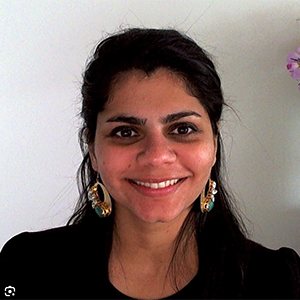
Devanshi Unadkat is an Assistant Professor in the College of Education at San Diego
State University. She received her Ph.D. from the University of California, Berkeley,
and her research and teaching focus on civic education, community-based learning,
and digital pedagogies. Unadkat has extensive experience designing programs that support
participatory learning, critical historical thinking, reflective collaborations,
and digital storytelling to support conversations and share learning. Prior to beginning
teaching undergraduate and graduate students in different contexts, Unadkat worked
with students from PreK-12 primarily supporting digital, critical, and civic literacy
development. Unadkat also has experience leading student teacher training and supporting
the development of programming that is broad-based, developmentally appropriate, and
responsive to community needs.
Affiliated Faculty Fellows
Jean Pfaelzer, Ph.D.
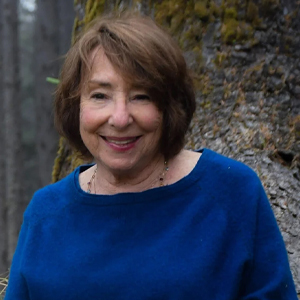 Jean Pfaelzer is the author of California, A Slave State (2023), winner of the 2024 Heyday History of the Year Award, and Driven Out: The Forgotten War Against Chinese Americans (2007), which was named one of the New York Times "100 Notable Books of the Year" and has been optioned for a four-part television
series. She is also the author of four other books and dozens of articles on race,
labor, gender, and immigration. Professor Pfaelzer was named Humanitarian of the Year
by United Chinese Americans and has contributed to several major public history projects,
including curatorial work for the Smithsonian’s I Want the Wide American Earth: An Asian Pacific American Story, and appearances in PBS documentaries such as 1882: The Chinese Exclusion Act and C-SPAN’s African American Slavery and the Underground Railroad in California. Currently Professor Emerita at the University of Delaware, she previously served
as Executive Director of the National Labor Law Center and as Senior Legislative Analyst
in the U.S. House of Representatives, focusing on immigration, labor, and women’s
issues. Pfaelzer has held numerous prestigious fellowships, including a Senior Fulbright
in American Studies at the University of Utrecht, a Senior Fellowship in American
History at Cambridge University (2024, 2026), and a Senior Visiting Fellowship at
the Bonn Center for Dependency and Slavery Studies (2025). For the ARCH Project, she
serves as a presenter and evaluator.
Jean Pfaelzer is the author of California, A Slave State (2023), winner of the 2024 Heyday History of the Year Award, and Driven Out: The Forgotten War Against Chinese Americans (2007), which was named one of the New York Times "100 Notable Books of the Year" and has been optioned for a four-part television
series. She is also the author of four other books and dozens of articles on race,
labor, gender, and immigration. Professor Pfaelzer was named Humanitarian of the Year
by United Chinese Americans and has contributed to several major public history projects,
including curatorial work for the Smithsonian’s I Want the Wide American Earth: An Asian Pacific American Story, and appearances in PBS documentaries such as 1882: The Chinese Exclusion Act and C-SPAN’s African American Slavery and the Underground Railroad in California. Currently Professor Emerita at the University of Delaware, she previously served
as Executive Director of the National Labor Law Center and as Senior Legislative Analyst
in the U.S. House of Representatives, focusing on immigration, labor, and women’s
issues. Pfaelzer has held numerous prestigious fellowships, including a Senior Fulbright
in American Studies at the University of Utrecht, a Senior Fellowship in American
History at Cambridge University (2024, 2026), and a Senior Visiting Fellowship at
the Bonn Center for Dependency and Slavery Studies (2025). For the ARCH Project, she
serves as a presenter and evaluator.
Claudio Saunt, Ph.D.
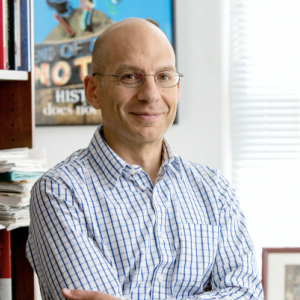 Claudio Saunt is the Richard B. Russell Professor of American History, Regents' Professor,
and Co-Director of the Center for Virtual History at the University of Georgia. He
is the author of four acclaimed books, including West of the Revolution (2014), Black, White, and Indian (2005), and A New Order of Things (1999). His most recent work, Unworthy Republic (2020), received the Bancroft Prize, the Robert F. Kennedy Book Award, and the Ridenhour
Book Prize, and was a finalist for the National Book Award. A pioneer in digital history,
Saunt has led several major online projects, including The Invasion of America and, with Elizabeth Fenn, Pox Americana. In 2018, he received an NEH Humanities Collections and Reference Resources grant
to create an interactive time-lapse map of African, Native, and European populations
in North America from 1500 to 1800. Supported by a 2022 Guggenheim Fellowship, his
current project, The Land Beneath Our Feet, digitally maps the Cherokee Nation in the 1830s, capturing the lives of the families
displaced during Indian Removal. For the SDSU ARCH Project, he serves as a presenter
and evaluator.
Claudio Saunt is the Richard B. Russell Professor of American History, Regents' Professor,
and Co-Director of the Center for Virtual History at the University of Georgia. He
is the author of four acclaimed books, including West of the Revolution (2014), Black, White, and Indian (2005), and A New Order of Things (1999). His most recent work, Unworthy Republic (2020), received the Bancroft Prize, the Robert F. Kennedy Book Award, and the Ridenhour
Book Prize, and was a finalist for the National Book Award. A pioneer in digital history,
Saunt has led several major online projects, including The Invasion of America and, with Elizabeth Fenn, Pox Americana. In 2018, he received an NEH Humanities Collections and Reference Resources grant
to create an interactive time-lapse map of African, Native, and European populations
in North America from 1500 to 1800. Supported by a 2022 Guggenheim Fellowship, his
current project, The Land Beneath Our Feet, digitally maps the Cherokee Nation in the 1830s, capturing the lives of the families
displaced during Indian Removal. For the SDSU ARCH Project, he serves as a presenter
and evaluator.
Steven B. Smith, Ph.D.
 Steven B. Smith is the Alfred Cowles Professor of Political Science and Professor
of Philosophy at Yale University, where he has taught since 1984. A scholar of the
history of political philosophy, his work explores the tensions between ancient and
modern thought, the intersection of religion and politics, and the theory and practice
of representative government. He is the author of several influential books, including
Hegel’s Critique of Liberalism, Spinoza’s Book of Life, Reading Leo Strauss, Political Philosophy, and Modernity and Its Discontents, and most recently co-edited The Cambridge Companion to Isaiah Berlin. Smith received his Ph.D. from the University of Chicago and has served in numerous
roles at Yale, including Master of Branford College and Co-Director of the Yale Center
for the Study of Representative Institutions. A recipient of the Lex Hixon Prize for
Teaching Excellence, he serves the ARCH Project as a speaker and evaluator of resources.
He is also a lifelong Yankees fan with hopes of joining the roster in the next life.
Steven B. Smith is the Alfred Cowles Professor of Political Science and Professor
of Philosophy at Yale University, where he has taught since 1984. A scholar of the
history of political philosophy, his work explores the tensions between ancient and
modern thought, the intersection of religion and politics, and the theory and practice
of representative government. He is the author of several influential books, including
Hegel’s Critique of Liberalism, Spinoza’s Book of Life, Reading Leo Strauss, Political Philosophy, and Modernity and Its Discontents, and most recently co-edited The Cambridge Companion to Isaiah Berlin. Smith received his Ph.D. from the University of Chicago and has served in numerous
roles at Yale, including Master of Branford College and Co-Director of the Yale Center
for the Study of Representative Institutions. A recipient of the Lex Hixon Prize for
Teaching Excellence, he serves the ARCH Project as a speaker and evaluator of resources.
He is also a lifelong Yankees fan with hopes of joining the roster in the next life.
Research Fellows
Jordan Ambrose
Jordan Ambrose is a United States Army veteran and current history major at San Diego State University, where he maintains a 3.74 GPA and expects to graduate in Fall 2025. With a strong interest in colonial and Atlantic history—especially in the New World—he aspires to teach Latin American colonial history at the college level. His military experience includes managing and training small teams, maintaining over $1 million in sensitive equipment, and instructing groups of 30–60 soldiers, which sharpened his leadership, organizational, and teaching skills. He brings excellent research, writing, and technological capabilities to his academic work. Ambrose is drawn to the American Revolutionary and Constitutional period because it represents one of the most transformative eras in world history, where traditional power structures, religious dogma, and imperial dominance were challenged by revolutionary ideas centered on individualism, logic, and social progress. The improbable success of such upheaval in the face of vast imperial power captures his fascination and underscores the global significance of the era.
Mitchell George
 Mitchell George, originally from Carlsbad, California, earned his B.A. in Military
and International History from Brunel University London in 2023, where his award-winning
dissertation challenged common myths about General Douglas Haig in World War I. Now
a graduate student in San Diego State University’s War and Society program, he focuses
on Britain’s Indian and France’s African soldiers from the eighteenth century through
the World Wars. His academic interests span British and European military history
from the seventeenth century to World War II. Mitchell is drawn to the American Revolution
due to the many myths surrounding it in U.S. education and media. He hopes to offer
a British perspective on the conflict, highlight its internal divisions within Britain,
and connect it to earlier English revolutions that inspired the Founding Fathers.
He also aims to reassess King George III’s legacy and promote a clearer, more accurate
understanding of the Revolution and its global context.
Mitchell George, originally from Carlsbad, California, earned his B.A. in Military
and International History from Brunel University London in 2023, where his award-winning
dissertation challenged common myths about General Douglas Haig in World War I. Now
a graduate student in San Diego State University’s War and Society program, he focuses
on Britain’s Indian and France’s African soldiers from the eighteenth century through
the World Wars. His academic interests span British and European military history
from the seventeenth century to World War II. Mitchell is drawn to the American Revolution
due to the many myths surrounding it in U.S. education and media. He hopes to offer
a British perspective on the conflict, highlight its internal divisions within Britain,
and connect it to earlier English revolutions that inspired the Founding Fathers.
He also aims to reassess King George III’s legacy and promote a clearer, more accurate
understanding of the Revolution and its global context.
Jack Krepps
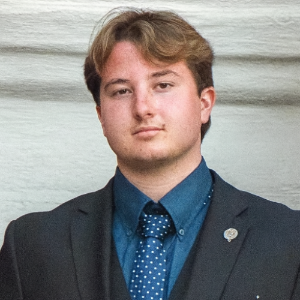 Jack Krepps is a second-year student at San Diego State University majoring in Political
Science and Public Administration with a minor in History. His passion for history
began in childhood with his grandparents and grew into a fascination with the American
Revolution and the ideals it represents. With a family background in military service,
Jack sees the Revolution as a living legacy that continues to shape American civic
life. As a competitive debater at SDSU, he explores historical and political ideas
through current events. In his freshman year, he read and annotated every paragraph
of Alexis de Tocqueville’s Democracy in America, deepening his belief that understanding
today’s society requires a strong grasp of its Revolutionary and Constitutional roots.
Jack Krepps is a second-year student at San Diego State University majoring in Political
Science and Public Administration with a minor in History. His passion for history
began in childhood with his grandparents and grew into a fascination with the American
Revolution and the ideals it represents. With a family background in military service,
Jack sees the Revolution as a living legacy that continues to shape American civic
life. As a competitive debater at SDSU, he explores historical and political ideas
through current events. In his freshman year, he read and annotated every paragraph
of Alexis de Tocqueville’s Democracy in America, deepening his belief that understanding
today’s society requires a strong grasp of its Revolutionary and Constitutional roots.
Sheamus O’Brien
 Sheamus O’Brien, born and raised in San Diego, is a recent graduate of San Diego State
University with a Bachelor’s Degree in History. He is currently pursuing graduate
studies in the SDSU History Department, while serving as the department’s student
assistant and as an assistant for the SDSU Center for Comics Studies. His academic
research focuses on the intersection and cooperation between Irish anticolonial resistance
and anticolonial movements abroad. Through the American Revolution and Constitution
History (ARCH) Project, Sheamus seeks to foster dialogue on how the U.S. Constitution
shapes America’s identity and how the legacy of a nation founded in opposition to
Britain’s colonial empire inspired anticolonial movements around the globe well into
the twentieth century.
Sheamus O’Brien, born and raised in San Diego, is a recent graduate of San Diego State
University with a Bachelor’s Degree in History. He is currently pursuing graduate
studies in the SDSU History Department, while serving as the department’s student
assistant and as an assistant for the SDSU Center for Comics Studies. His academic
research focuses on the intersection and cooperation between Irish anticolonial resistance
and anticolonial movements abroad. Through the American Revolution and Constitution
History (ARCH) Project, Sheamus seeks to foster dialogue on how the U.S. Constitution
shapes America’s identity and how the legacy of a nation founded in opposition to
Britain’s colonial empire inspired anticolonial movements around the globe well into
the twentieth century.
Kelly Sorber
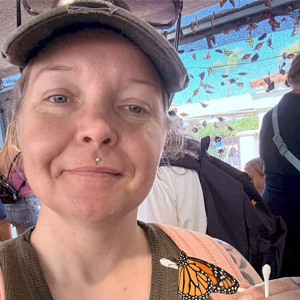 Kelly Sorber is a retired U.S. Navy Chief Petty Officer (E-7) who served for 20 years
as an Aviation Electrician’s Mate, deploying across the globe and working extensively
on five variants of the H-60 helicopter as well as the F-35C. In the final years of
her service, she led as a Flight Deck Coordinator and served as a Command Equal Opportunity
Manager, where she demonstrated both operational expertise and a commitment to personnel
development. Following her retirement in 2021, she earned an A.A. in History from
San Diego Mesa College in 2022 and a B.A. in Social Science from San Diego State University
in 2025. She returned to SDSU in Fall 2025 to begin graduate studies in History, focusing
on United States history. Sorber’s interest in the Revolutionary and Constitutional
era is rooted in a desire to understand the foundations of the United States—its early
struggles, evolving ideals, and the transition from colonial resistance to constitutional
governance. She believes that a deep understanding of these formative years is essential
for interpreting the nation’s present challenges and future direction.
Kelly Sorber is a retired U.S. Navy Chief Petty Officer (E-7) who served for 20 years
as an Aviation Electrician’s Mate, deploying across the globe and working extensively
on five variants of the H-60 helicopter as well as the F-35C. In the final years of
her service, she led as a Flight Deck Coordinator and served as a Command Equal Opportunity
Manager, where she demonstrated both operational expertise and a commitment to personnel
development. Following her retirement in 2021, she earned an A.A. in History from
San Diego Mesa College in 2022 and a B.A. in Social Science from San Diego State University
in 2025. She returned to SDSU in Fall 2025 to begin graduate studies in History, focusing
on United States history. Sorber’s interest in the Revolutionary and Constitutional
era is rooted in a desire to understand the foundations of the United States—its early
struggles, evolving ideals, and the transition from colonial resistance to constitutional
governance. She believes that a deep understanding of these formative years is essential
for interpreting the nation’s present challenges and future direction.
Mia Tumbaga
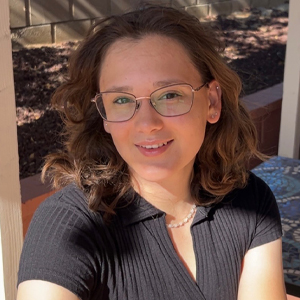 Mia Tumbaga is a graduate student in the M.A. History program at San Diego State University.
Mia graduated Summa Cum Laude from UCLA with a B.A. in History with the goal of earning
a Ph.D. Mia's research emphasis is on migrant labor in the California agricultural
borderlands, specifically through the lens of race and class during the Great Depression.
Mia is primarily interested in how race and class interact in culturally diverse areas
during times of economic distress When not studying or conducting research, Tumbaga
enjoys spending time with her dog and family.
Mia Tumbaga is a graduate student in the M.A. History program at San Diego State University.
Mia graduated Summa Cum Laude from UCLA with a B.A. in History with the goal of earning
a Ph.D. Mia's research emphasis is on migrant labor in the California agricultural
borderlands, specifically through the lens of race and class during the Great Depression.
Mia is primarily interested in how race and class interact in culturally diverse areas
during times of economic distress When not studying or conducting research, Tumbaga
enjoys spending time with her dog and family.
Andrew Wickman
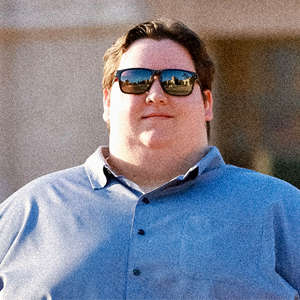 Andrew Wickman is a History major at San Diego State University pursuing a Bachelor's
Degree with an emphasis on teaching. A transfer student from Grossmont Community College,
he earned Associate Degrees in History and University Studies before continuing his
academic journey. He is a member of both the Tau Sigma and Phi Alpha Theta History
Honors Societies. Committed to becoming a professor, he plans to pursue a Master's
Degree to inspire others to explore the history of the United States. Andrew believes
that understanding our past is essential to improving our future. His academic interests
focus on the Revolutionary War and the Constitutional Period, a passion sparked by
a course with Professor Eve Kornfeld that revealed often-overlooked aspects of the
era. He is particularly interested in examining the experiences and cultures of Indigenous
peoples during this transformative period in American history.
Andrew Wickman is a History major at San Diego State University pursuing a Bachelor's
Degree with an emphasis on teaching. A transfer student from Grossmont Community College,
he earned Associate Degrees in History and University Studies before continuing his
academic journey. He is a member of both the Tau Sigma and Phi Alpha Theta History
Honors Societies. Committed to becoming a professor, he plans to pursue a Master's
Degree to inspire others to explore the history of the United States. Andrew believes
that understanding our past is essential to improving our future. His academic interests
focus on the Revolutionary War and the Constitutional Period, a passion sparked by
a course with Professor Eve Kornfeld that revealed often-overlooked aspects of the
era. He is particularly interested in examining the experiences and cultures of Indigenous
peoples during this transformative period in American history.